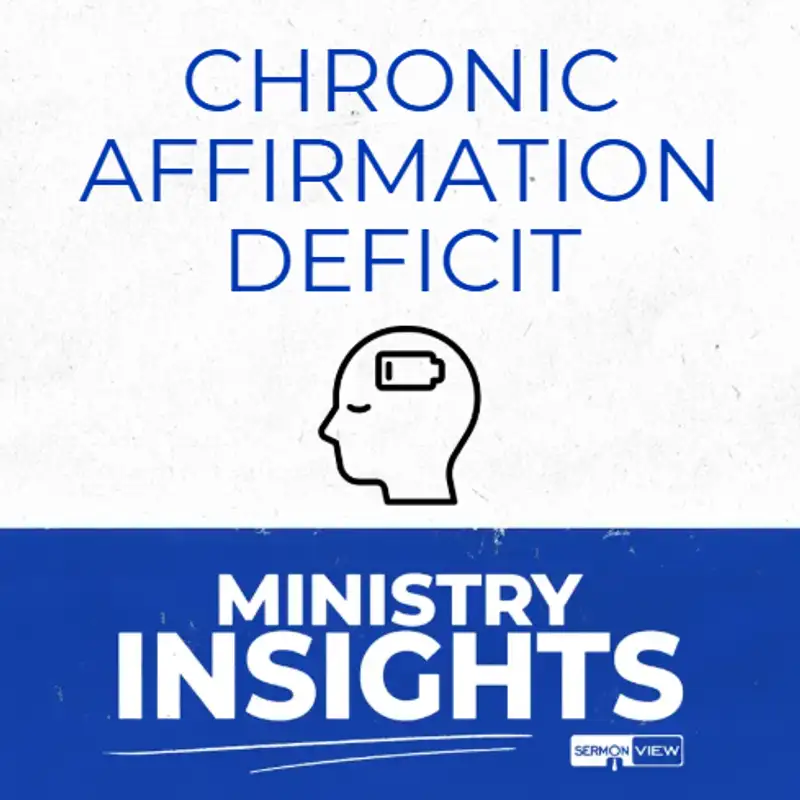How to Overcome Chronic Affirmation Deficit
This is the Ministry Insights podcast from Sermonville. Inspiration, education, and affirmation for pastors and church leaders. Here's our founder and president, Larry Witzel.
Larry:When someone expresses appreciation to you or acknowledges something positive about you, it's like sunlight and water for your soul. Affirmation is incredibly powerful. But today, many of us live with chronic affirmation deficit where voices of criticism drown out the words of affirmation. Well, in this episode, I want to share with you why affirmation is so powerful and 4 things you can do for yourself if you're living with chronic affirmation deficit. Hello.
Larry:I'm Larry Witzel with another ministry insight from Sermon View. I'm so excited about today's topic. It's something I've been thinking about for a while, and I really hope that it impacts you as much as it has me. Today, I wanna talk about affirmation. Words of affirmation hold incredible power.
Larry:When someone affirms something about you, it feels good to be seen and recognized for who you are or something you've done. A 2016 study by Cascio and colleagues used functional MRI to study people who received praise, and they saw that affirmation activated brain regions associated with self processing and reward. In other words, affirmation is not only psychologically beneficial, but also neurologically rewarding. However, criticism mitigates the impact of affirmation significantly. Negative interactions like criticism, or conflict, or negative feedback counteract the effect of positive interactions such as affirmations, compliments, and supportive gestures.
Larry:John Gottman's research at the University of Washington found that for a relationship to be healthy, you need 5 positive interactions for every negative one, 5 to 1. So what happens when you're not getting enough affirmations to counteract criticism? Well, this chronic affirmation deficit can lead to reduced productivity, less collaboration, and feelings of anxiety and even burnout. And here's the thing. Pastors in particular are susceptible to chronic affirmation deficit.
Larry:You have a public position that exposes you to criticism. You're also in a position of authority, which means that you're less likely to receive affirmation for your work anyway. Now I'm not talking about everyone after a service saying great sermon. You know that that's mostly just people being polite. I'm talking about genuine affirmation for something positive that you've done.
Larry:And in my experience, that 5 to 1 ratio for pastors is more likely flipped. You're probably experiencing 5 negative interactions for every positive one. You probably have people in your church who would rather criticize than help, and this impacts you. A lot of churches are also focused on rules based behavior, which naturally leads to more negativity. It can't help but create a negative atmosphere that impacts your soul.
Larry:As a result, you're less likely to innovate in your ministry because innovation is risky. You're less likely to try new things, except that the world is changing, and we have to innovate our ministry practices in order to reach people in this changing world. We We don't want to water down the message, of course, but the way we communicate has to change. And if you're living with chronic affirmation deficit, innovation feels really risky. I also think that's why so many pastors have considered quitting.
Larry:Doing ministry with chronic affirmation deficit is just hard, and a study from Barner Research a couple years ago found that 42% of pastors were considering leaving their jobs. Of course, it's not just pastors. The world has just gotten meaner, hasn't it? A more negative. People will say things on social media that they would never say to someone's face, and the entire environment is toxic and divisive.
Larry:There are probably a lot of people in your church and in your community living with chronic affirmation deficit. And if all this sounds depressing, well, that's because chronic affirmation deficit can actually lead to depression. But there is hope. There are things that you can do to counteract the voices of criticism wherever they're coming from. So now I want to share 4 things that you can do to counteract chronic affirmation deficit.
Larry:First of all, listen to God. You are a child of God, heir to his kingdom. He loves you more than you could possibly imagine, and the Bible is rich with passages affirming your worth as a child of God. So spending time in God's word is a natural antidote to criticism. For example, the apostle Paul wrote in Ephesians, we are God's masterpiece.
Larry:He's created us anew in Christ Jesus so we can do the good things he planned for us long ago. And in Zephaniah 3:17, it says that God takes delight in you with gladness. He rejoices over you with joyful songs. Spending time in God's word every day will help you overcome affirmation deficit. 2nd, surround yourself with voices of affirmation both in person and online.
Larry:With this ministry insight series, I've been really intentional about having a spirit of positivity and love and affirmation for you as a pastor. And there are other podcasts and YouTube channels that also offer affirmation like this. But more than that, spend time with people in person who are truly affirming to you and to your family and to your calling. If you have a leader on your team who's particularly negative, make sure you spend time with others who are positive to counteract that. The people you spend time with have a huge impact on your mental health, so find people who help to fill your cup and connect with them regularly.
Larry:Related to this, watch how you talk to yourself. That 2016 study by Cascio and colleagues I mentioned earlier noted that self criticism is particularly insidious. So make sure you give yourself the grace that you offer to those around you. Personally, I'm really bad at this. I I have really high expectations for myself, and if I don't meet those expectations, I can be pretty hard on myself.
Larry:And if you're like that, please give yourself grace and speak positive words to yourself. That study found that self affirmation is particularly powerful. So speak kindly to yourself and give yourself the grace that you give to others. And finally, give words of affirmation to others. Positive expressions to the people around you activate neural pathways associated with positive emotions and reward.
Larry:It releases dopamine and serotonin when you affirm somebody else. And when you as a leader create an environment where words of affirmation are normalized, everybody is lifted up. But even if you're the only affirming voice, it still helps to counteract your own affirmation deficit. Affirming others is really powerful. Now I do want to say that we need negative feedback to grow.
Larry:We each have blind spots and using criticism to clarify a potential area of growth is good and healthy. Some criticism is going to be appropriate, but don't sit in it. Receive it, use it to motivate healthy change in your life, but don't wallow in it. It's easy for me to focus on the negative in myself, but that's not healthy. Have ears to hear, but don't dwell in it.
Larry:So a lot of people live in an environment filled with more negativity than praise. And if you're living with chronic affirmation deficit, listen to the affirmations from God's word. Surround yourself with positive voices. Be kind to yourself avoiding harsh self criticism, and offer words of affirmation to others. Do this consistently, and you can begin to change that balance and allow God to reduce your affirmation deficit.
Larry:If this episode has been particularly impactful to you, will you give us some affirmation as well? Subscribe to the podcast using whatever platform you use. And if you're watching on YouTube, subscribe and like the video too. We really appreciate it. Pastor, I love the work that you do.
Larry:Ministering to people in their time of need and encouraging them to grow spiritually is hard work, and I appreciate the way that you give yourself away every single day. I appreciate the way you put yourself out there. Remember to give yourself the same grace that you give to others and then watch what God is gonna do through you to reach your community. I love you guys. I'm cheering for you.
Larry:I'll see you next time.
Larry:This has been the Ministry Insights podcast from Sermon View. Inspiration, education, and affirmation for pastors and church leaders. Sermon View powers digital evangelism and community connection, offering technology and services that help churches spread the gospel and foster spiritual growth. Learn more about how we can help your church make a lasting impact atsermonview.com. This episode was edited by Kari Dixon, marketing communications by Lori Ball, and social media management by Gregory Boney.
Larry:The executive producer is Larry Witzel, and I'm Danielle Farrell. Please join us again next time for another episode of Ministry Insights from Sermon View.
Creators and Guests


